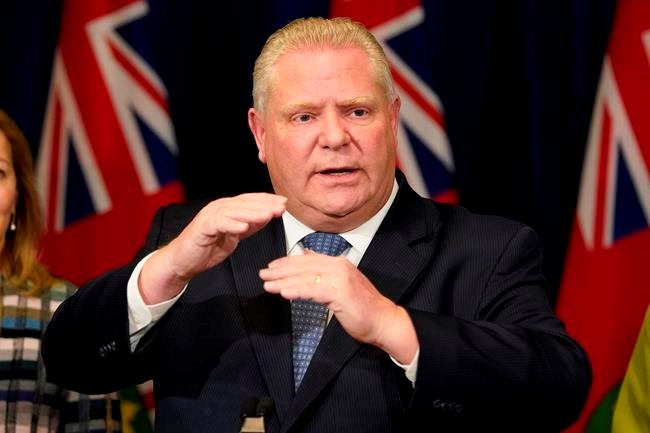TORONTO — Ontario health officials confirmed the province's first death in a patient with COVID-19 on Tuesday, hours after Premier Doug Ford declared a state of emergency.
The 77-year-old man in the Muskoka region was a close contact of another positive case and wasn't listed as a confirmed case before he died, said Ontario's chief medical officer of health.
Rather, the man was under investigation for the virus and COVID-19 was discovered after his death, Dr. David Williams said.
The investigation into the exact cause of death is ongoing, health officials said, noting it isn't known if the man died of COVID-19 or with COVID-19.
The man's close contact is hospitalized in the Royal Victoria Regional Health Centre in Barrie, the Simcoe Muskoka District Health Unit said.
The state of emergency declared by Ford mandates the closure of bars, restaurants, theatres and libraries, while banning public events with more than 50 people.
"We're facing an unprecedented time in our history," Ford said. "This was a decision that was not made lightly. COVID-19 constitutes a danger of major proportions."
The declaration's intent is to slow the spread of the novel coronavirus and avoid overwhelming the health-care system, Ford said.
Effective immediately, the province ordered the closure of all facilities providing indoor recreation programs, as well as all public libraries, private schools, licensed childcare centres, theatres, cinemas and concert venues. Bars and restaurants may only provide takeout and delivery.
Ontario previously ordered all public schools closed for two weeks following March break.
The emergency order also bans public gatherings of over 50 people, including parades, events and services within places of worship. It is in place until March 31.
Shopping malls are not included, but Ontario's chief medical officer of health said he is monitoring that situation.
Essential services such as grocery stores, pharmacies, convenience stores, public transit, manufacturing facilities, construction sites and office buildings will continue to operate, Ford said.
"I want to be very clear about what this means and what this doesn't mean: This is not a provincial shutdown," Ford said. "The vast majority of businesses, including those most vital to day-to-day life, will not be affected by this order."
Ontario has reported a total of 185 cases of COVID-19, with five of them fully resolved. Eight new infections were added Tuesday — nine, counting the death, which would bring the total to 186 — the smallest number of new cases in several days.
But Williams warned against reading too much into the relatively small increase.
"It will have its ebbs and flows," he said. "We'll probably have quite different numbers again tomorrow.... We'd need a lot more data before we'd feel there was an indication of any trend in either direction."
Associate chief medical officer of health Dr. Barbara Yaffe also noted there are more specimens in the testing queue. As of Tuesday morning there were 1,566 cases under investigation.
The province has set aside a $100-million contingency fund, and is receiving $200 million from the federal government. That money is all being directed to health-care resources, Ford said, and a provincial support package for businesses is in the works.
The money will be used to open 75 more critical care beds in hospitals, as well as 500 post-acute care beds and to help hospitals set up 25 more COVID-19 assessment centres.
Ontario is also purchasing more personal protective equipment like masks, gloves and surgical gowns for front-line health workers, as well as more ventilators.
There will also be more money for long-term care homes for additional staffing and infection control measures, and a fund is being set up to provide respite care and child-care services for front-line workers in COVID-19 assessment centres.
Scrapping time-of-use electricity pricing is being considered, Ford said, as people are now largely at home during the hours with peak rates.
The legislature — on a scheduled week-long break that could be extended — will reconvene Thursday to introduce and potentially pass a bill to ban employers from requiring sick notes for those in self-isolation or quarantine. It would also ensure protected leave for workers who have to take unpaid time off for those reasons.
NDP Leader Andrea Horwath said a small number of her caucus members will go vote on the legislation and she is asking that social distancing be part of the plan for that day.
A spokeswoman for Attorney General Doug Downey said Tuesday that sheriff's offices across the province have been asked to postpone any scheduled enforcement of eviction orders set for this week and that no new eviction orders will be issued until further notice.
This report by The Canadian Press was first published March 17, 2020.
Allison Jones and Shawn Jeffords, The Canadian Press



